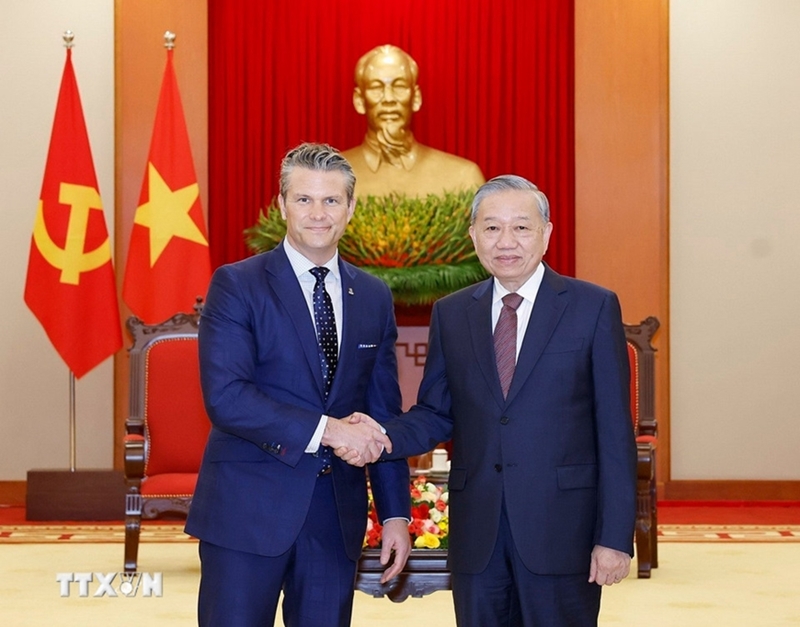These joint efforts not only carry profound humanitarian value but also serve as a vital foundation to heal the wounds of the past, build goodwill and mutual trust, and pave the way for a long-term partnership between the two countries, he told U.S. Secretary of War Pete Hegseth during a reception in Hanoi on November 2.
    |
 |
|
Party General Secretary To Lam (right) and U.S. Secretary of War Pete Hegseth |
General Secretary Lam welcomed Hegseth’s official visit which coincides with the 30th anniversary of diplomatic ties and the 50th anniversary of the war’s end in Vietnam, saying that the visit holds significance as it reflects a long journey the two nations have taken to build today’s increasingly trusted, substantive, and sustainable Comprehensive Strategic Partnership.
On the occasion, he conveyed greetings to U.S. President Donald Trump and invited the President and First Lady to visit Vietnam soon.
He affirmed Vietnam’s consistent foreign policy of independence, self-reliance, diversification and multilateralization, adherence to international law, and promotion multilateralism for peace, friendship, cooperation and development.
Vietnam always considers the U.S. one of its most important partners and seeks to further deepen extensive bilateral ties across various sectors for the benefit of their people, he said.
Commending President Trump’s efforts to promote peace and settle global conflicts, he affirmed Vietnam’s readiness to play an active, responsible role in seeking solutions to global and regional issues.
He praised the outcome of talks between Secretary Hegseth and Vietnamese Defense Minister Phan Van Giang, noting that defense cooperation has become a key pillar of bilateral relations. He urged both sides to continue advancing substantive, mutually respectful defense collaboration based on respect for independence, sovereignty, and territorial integrity, and principles of external relations and national defense of Vietnam, contributing to bolstering strategic trust and ensuring regional peace and stability.
Hegseth, for his part, said he was honored to visit Vietnam, a nation that is playing an increasingly important role in the Indo-Pacific region. Conveying President Trump’s greetings to the host, he commended the General Secretary’s leadership in shaping the Vietnam - U.S. relationship. On behalf of the U.S. Government, he also offered sympathy over recent flood losses in north central Vietnam.
The U.S. values its Comprehensive Strategic Partnership with Vietnam and supports a strong, independent, resilient and prosperous Vietnam, he said, adding that the U.S. wishes to enhance strategic cooperation both bilaterally and regionally, particularly in countering transnational crime, maritime security, humanitarian assistance, officer training, U.N. peacekeeping, and disaster response.
The U.S. will continue to help Vietnam improve defense capacity, modernize its defense industry, and expand quality personnel training programs, he said.
The U.S. Secretary highlighted ongoing progress in post-war remediation efforts, including dioxin cleanup projects at Bien Hoa and Da Nang airports, calling them vivid symbols of reconciliation and partnership. He pledged continued coordination with the Vietnamese Ministry of Defense (MoD) to complete ongoing projects and explore new areas of cooperation suited to both sides’ needs and ability.
Both sides agreed that maintaining high-level exchanges and regular dialogues between their defense agencies, particularly between the MoD and the U.S. Department of War, is essential to build trust, deepen the Comprehensive Strategic Partnership, and contribute to global and regional peace, stability, cooperation and development.
The host closed by advocating for sustained cooperation based on mutual respect, equality, shared benefit and long-term interests of their people. He expressed confidence that with resolve of the two countries' leaders, bilateral relations will enter a new era of substantive cooperation and sustainable development.
Source: VNA